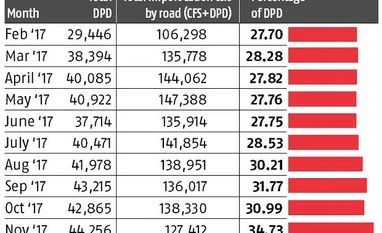With the direct port delivery (DPD) service at Jawaharlal Nehru Port gaining traction, container freight station (CFS) operators near the port are cutting jobs as revenue volumes drop amid high capital costs.
“Earlier, we were handling 4,500-5,000 containers per month. But since the DPD service, this has halved to 2,000 containers (per month). We have had to shrink operations,” Jude Fernandes, vice-president of KerryIndev Logistics, told Business Standard. “We have reduced nearly 40 per cent of our sub-contracts. This has led to job cuts in the industry,” he added.
Surveyors, drivers, security, house keeping and labour contracts among others are part of the sub-contract segment in the CFS industry. KerryIndev Logistics with CFS facilities at JNPT, Chennai, Tuticorin and Puducherry is a leading logistics service provider holding 20 acre space in Navi Mumbai, including 12 acres of container paved stock yard and 6 acres of empty container yard. The company has over 2,000 employees and owns more than 200 fleets of transportation of containerised, break bulk and Over Dimensional Cargo (ODC).
The DPD service allows importers and consignees to take delivery of containers directly from port terminals, without having to park these at a container freight station before being taken to the factories. This service was introduced in February 2016 to improve ease of doing business and is currently actively carried out at the Jawaharlal Nehru, Chennai and Mundra ports. Among the major ports, JNPT has the highest number of CFS facilities of 35 operators. Due to this fast track delivery system, an importer secures clearance for the cargo in 2-3 days, against 8-10 days earlier.
Source: Parliament papers
Currently, JNPT has 1,249 registered members to avail the DPD facility, up from 700 members when it was introduced in 2016. Companies such as Allcargo Logistics, Gateway Distriparks, Navkar Corporation, APM Terminals India and Balmer Lawrie are part of the domestic CFS industry.
The domestic CFS industry is structured in a manner where nearly 60 per cent of their clients are importers which use their facilities for longer duration of about 8-10 days while the balance is housed by exporters where the cargo is for a much shorter duration. With importers increasingly availing of the DPD service, it is this major portion of CFS operators’ revenue volume that is taking a hit. According to per JNPT website, availing the DPD service results in saving Rs 15,000-20,000 per container for an importer.
“With so many CFS operators at JNPT, there was stiff competition among the players. With DPD service gaining traction, it is a double whammy for operators as volumes are taking a hit,” explained Hitesh Avachat, senior manager at CARE Ratings.
Though the DPD service has gained traction at JNPT, the country’s largest container port, it has not yet had the desired effect, say industry experts. Globally, no port has a CFS industry catering to storage of cargo. All across the world, cargo is directly delivered from the port to the final destination. According to the JNPT website, the share of DPD volume handled in December 2017 has gone up to 36 per cent from 27 per cent in February of the same year. (see chart).
“DPD has been a game changer no doubt, but it has a long way to go. All importers are still not ready for DPD and are yet to adapt to this change,” explained Vivek Singh Anand, president of the Mumbai and Nhava-Sheva Ship Agents Association (MANSA).
As for CFS players, the cost of capital is high since these facilities need sizeable land parcels to set up stations within the port town. At current land prices, it takes about Rs 1.50-1.75 billion to set up a CFS near the port, say experts.
“The business environment is turning hostile for the CFS industry. There is already 50 per cent excess capacity and since revenue volumes are falling, no new player is planning to set up facilities,” said Umesh Grover, secretary-general of the Container Freight Station Association of India (CFSAI).
The DPD system, which featured in the World Bank ease of doing business report, has put India 30 notches higher. Encouraged by the same, even private and less congested container port terminals such as Krishnapatnam and Visakhapatnam are offering DPD services.
“Chennai port has shown good traction in DPD from the beginning. Currently, about 17 per cent of the total cargo is under DPD service and we aim to take it to 40 per cent, but this depends on trade volumes and so we have not set any timeline,” said B Vimal, traffic manager at Chennai Port.
Unlock 30+ premium stories daily hand-picked by our editors, across devices on browser and app.
Pick your 5 favourite companies, get a daily email with all news updates on them.
Full access to our intuitive epaper - clip, save, share articles from any device; newspaper archives from 2006.
Preferential invites to Business Standard events.
Curated newsletters on markets, personal finance, policy & politics, start-ups, technology, and more.
)